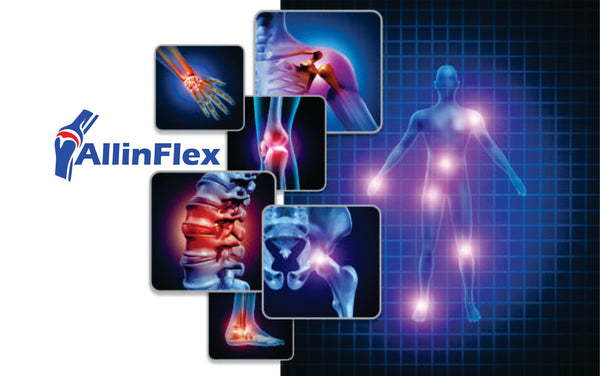Good Supplements for Joint Pain
Saskia OstermeierThe Issue of Sore Joints and Joint Pain
We've all experienced it, haven't we? That dull throb in your knees after a long day on your feet, the stiff ache in your fingers after hours of relentless typing. Sore joints and joint pain are no stranger to any of us, and they can really throw a spanner in the works of our daily routines.
Joint pain isn't picky; it can affect anyone, regardless of age, fitness level, or lifestyle. Perhaps you're an avid runner feeling the strain in your knees, or maybe you're working a desk job, noticing a nagging pain in your wrists. The source of discomfort might differ, but the outcome is often the same – disruption of your daily life and a decline in your quality of life.
So, what are the culprits behind this discomfort in your joints?
Well, numerous factors can contribute to joint pain, and understanding them is the first step towards finding relief.
One common cause is simple wear and tear. Just like the tyres on your car, your joints can get worn out over time, particularly those that bear the brunt of your body weight, like your knees and hips. This wear and tear can erode the cartilage in your joints, leading to a condition known as osteoarthritis, one of the most common sources of joint pain.
Overuse or strain is another potential cause. If you've been pushing yourself at the gym or taken up a new sport, your joints may protest against the new demands you're placing on them. This is typically because your body isn't accustomed to the level of activity or the specific movements you're making.
Injuries, either recent or from years ago, can also lead to joint pain. Sprained ligaments, strained muscles, ruptured disks, and even broken bones can cause pain in the joints. Additionally, conditions like rheumatoid arthritis, gout, and fibromyalgia are all known to cause joint discomfort.
Lastly, inflammation plays a significant role in joint pain. It's your body's natural response to injuries or disease, but when it happens in your joints, it can cause pain, stiffness, and swelling.

The link between joint pain and inflammation is a crucial one and paves the way for a discussion on the potential benefits of supplements.
Certain supplements are known to have anti-inflammatory properties and, therefore, can be beneficial in managing joint pain. But we'll delve deeper into that a bit later.
Remember, understanding the cause is the first step towards managing and potentially reducing joint pain. With this understanding, you can make informed decisions about potential treatments, lifestyle modifications, and yes, even supplements for sore joints. So, keep reading as we explore this further in the following sections.
Delving Deeper: Medical Conditions Causing Joint Pain
In some instances, sore joints and joint pain stem from more than just a strenuous workout or a long day on your feet. Various medical conditions such as osteoarthritis, rheumatoid arthritis, bursitis, gout, or strains can play a significant role in causing joint discomfort. Let's take a closer look at how these conditions contribute to the pain you might be experiencing.
Starting with osteoarthritis, this condition is often described as 'wear and tear' arthritis, and it's the most common type of arthritis. As you age, the cartilage that cushions your joints starts to deteriorate. Without this protective layer, the bones within your joints can rub together, causing inflammation, swelling, and yes, that familiar pain.
Rheumatoid arthritis, on the other hand, is an autoimmune disease. That means your body's immune system gets a bit confused and starts attacking your own tissues, including the linings of your joints. This leads to inflammation, resulting in swollen, painful joints. The pain from rheumatoid arthritis is often more severe than that of osteoarthritis and can affect more than just your joints.
Next, we have bursitis, an inflammation of the small fluid-filled pads (bursae) that act as cushions at your joints. Repetitive motions or positions that put pressure on the bursae around your joints can cause this condition. Think of kneeling or leaning your elbows on a desk for extended periods – these actions can trigger bursitis, leading to pain and swelling in your joints.
Gout is another condition that causes intense joint pain, often in the big toe. It occurs when urate crystals accumulate in your joints, causing inflammation and severe pain episodes, or 'gout attacks'. These attacks can strike suddenly, often at night, and can cause your joints to feel as if they're on fire.
Strains, while not a chronic condition like the others, can still lead to considerable joint pain. Overstretching or tearing muscles and tendons can result in a strain. This injury can cause pain and inflammation around the joints that the affected muscle or tendon is connected to.
As you can see, these conditions all have one thing in common - they cause inflammation, leading to pain and discomfort.
This brings us to the question: what exactly is inflammation and how does it contribute to joint pain?
In its simplest terms, inflammation is your body's natural response to injury or disease. When a joint is damaged, your body springs into action, producing chemicals that increase blood flow to the affected area. This causes redness, heat, swelling, and pain - the classic signs of inflammation.
While inflammation is a necessary process for healing, chronic inflammation, like that seen in rheumatoid arthritis or continuous wear and tear in osteoarthritis, can lead to persistent pain and joint damage.
It's also worth noting that inflammation isn't always a bad thing.
Inflammation - it's a term that's often vilified, especially in the context of joint pain. However, it's important to remember that inflammation isn't always the villain in the story. In fact, it's a crucial part of your body's healing process. It's like your body's personal army, ready to defend and repair after an injury or attack from an illness.
Picture this: you've accidentally cut your finger. Almost immediately, the area becomes red, slightly warm, and swells up a bit - these are the tell-tale signs of inflammation. What's happening is that your body is increasing the blood flow to the injured area to deliver nutrients and immune cells that aid in healing. It's your body's way of saying, "All hands on deck, we've got a situation to fix!"
So, in the short term, inflammation is a good thing. It's your body's natural response to protect and heal itself. But when inflammation sticks around for too long, that's when things can start to go awry. Chronic, long-term inflammation can turn against your body, leading to ongoing pain and damage, particularly in your joints.
Sore joints and joint pain are closely tied to inflammation. Whether it's due to a strenuous workout, an injury, or a chronic condition like rheumatoid arthritis or osteoarthritis, inflammation is usually the common denominator. This persistent inflammation can lead to stiffness, swelling, and pain that can disrupt your day-to-day life.
The Power of Supplements for Joint Health
Supplements, believe it or not, can indeed play a key role in supporting joint health and reducing discomfort. Think of them as your supporting actors, not necessarily the stars of the show, but they're there to boost the performance.
How do they do it? Many supplements designed for joint health contain ingredients that either reduce inflammation, provide the building blocks for cartilage, or both.
Remember how we talked about inflammation being the cause of joint pain? Supplements for inflammation and joint pain often contain ingredients like omega-3 fatty acids, turmeric, or bromelain, all known for their anti-inflammatory properties.
Let's take omega-3 fatty acids as an example. They've been shown to reduce the production of molecules and substances linked to inflammation, which in turn, can help to alleviate joint pain.
Then we have supplements that contain ingredients like glucosamine and chondroitin. These two are naturally found in the body and are vital components of cartilage - the stuff that cushions your joints.
By providing your body with more of these compounds, supplements could potentially help maintain cartilage health and thus alleviate the discomfort associated with joint wear and tear.
That being said, it's important to remember that supplements aren't magic pills. They're not there to replace a balanced diet and healthy lifestyle, nor are they meant to substitute any prescribed medication or treatment plan. They're there to supplement these things.
In the next sections, we'll get more specific about which are the best supplements for sore joints, which ones might be considered the strongest supplement for joint pain, and how to use these supplements effectively.
What Supplements Help with Joint Pain and Tiredness?
Have you ever found yourself feeling worn-out and achy at the end of a long day? Joint pain and tiredness can be quite the unwelcome duo, making even simple tasks feel like a challenge. But what if I told you there are supplements that could help ease both these issues? Here's the inside scoop.
Let's start with Green Lipped Mussel. This isn't your ordinary shellfish - it's a powerhouse of nutrients. Hailing from the waters of New Zealand, this mussel is rich in omega-3 fatty acids, which as we've discussed earlier, has strong anti-inflammatory properties.
But what about tiredness? Well, these mussels are also a rich source of iron, a mineral essential for energy production. Low iron levels can lead to fatigue, so boosting your intake could help to keep tiredness at bay.
Next on our list is Turmeric, a spice well-loved not just for its flavour, but also for its health benefits. The secret lies in its active compound, curcumin, which has potent anti-inflammatory properties. Several studies have found that curcumin can reduce symptoms of joint pain. Plus, it has antioxidant properties, which help protect your cells from damage, supporting overall vitality and energy levels.
Thirdly, we have Glucosamine and Chondroitin. These two are often paired together in supplements because they work hand in hand to support joint health. They are key components of cartilage, and taking them as supplements can help to maintain the health of your cartilage, reducing joint pain.
Fastest Methods to Reduce Inflammation in the Joints
Dealing with inflamed joints can be a pain - quite literally. You've probably found yourself wishing for a fast forward button to skip the discomfort and get straight to feeling better. Well, while we might not have a magical remote, we do have some advice on the quickest ways to alleviate inflammation in your joints. Let's jump right in!
Firstly, let's talk about our all-stars – supplements. As we've discussed before, certain supplements can play a major role in reducing inflammation quickly. Remember Turmeric with its potent active compound, curcumin? It's one of the most effective natural anti-inflammatory agents. The same goes for the omega-3 fatty acids found in Green Lipped Mussel. These supplements can help reduce inflammation, thereby alleviating joint pain.
But here's the thing - supplements aren't just about popping a pill and waiting for miracles. For the best and fastest results, they should be paired with lifestyle modifications.
One of the quickest ways to reduce inflammation is to tweak your diet. Foods high in refined carbohydrates, fried foods, soda, and processed meats can cause inflammation in the body. Try to minimise these in your diet. Instead, focus on anti-inflammatory foods like fruits, vegetables, nuts, fish, and whole grains.
Physical activity is another crucial part of the equation. Regular exercise helps to reduce inflammation and can strengthen the muscles around your joints, improving stability and reducing strain. Now, don't think this means you need to start training for a marathon. Even light activities like walking, cycling, or swimming can make a significant difference.
Rest and relaxation are also key. Chronic stress is a known contributor to inflammation. Techniques such as meditation, deep breathing, or yoga can help manage stress levels, promoting relaxation and in turn, reducing inflammation.
Lastly, don't underestimate the power of a good night's sleep. During sleep, your body works on repairing muscles, joints, and other tissues. Getting enough quality sleep can help to reduce inflammation and speed up the healing process.
Best Supplements for Sore Joints
Finding the best supplements for your sore joints can sometimes feel like searching for a needle in a haystack. With countless products on the market, all making bold claims, it's hard to know where to start. We're here to shine a spotlight on some top-rated supplements that could help soothe your aching joints.
First up, let's revisit the dynamic duo of Green Lipped Mussel and Curcumin. When it comes to easing joint discomfort, these two are quite the power couple. Green Lipped Mussel, packed with omega-3 fatty acids, helps to reduce inflammation, a key player in joint pain. Combine this with the potent anti-inflammatory properties of curcumin, found in Turmeric, and you've got a potent tool in your arsenal against sore joints.
Or another specially formulated supplement that contains Glucosamine, Chondroitin, Collagen, Hyaluronic Acid, Boswellia, and Vitamin C.
This all-in-one supplement addresses multiple aspects of joint health. Glucosamine and Chondroitin support the health of your cartilage, Collagen provides the structural support, while Hyaluronic Acid ensures your joints stay lubricated. Boswellia is another potent anti-inflammatory agent, and Vitamin C plays a crucial role in collagen formation.
So, if you're dealing with sore joints, these supplements could be worth considering. As always, it's crucial to consult with a healthcare professional before starting any new supplement regimen.




